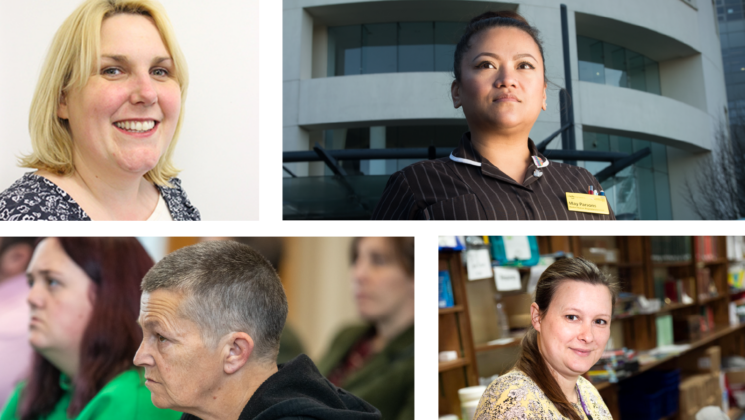Karen Jackson is a special educational needs (SEN) caseworker for Newcastle City Council, who has spent her whole working life in schools.
Pat Jones is a support worker for adults with learning difficulties in Bridgend, and has worked in various public services over her career, including being a social worker for 13 years.
Helen Astley is the chair of the UNISON Herefordshire Local Government branch, with 24 years of experience in library services.
May Parsons is modern matron for respiratory services at University Hospitals Coventry and Warwickshire Trust, who has worked in the NHS for 20 years.
U brought them together in January to speak with each other about their work – the current problems and, in particular, about what they could, and would love to achieve if their services were properly funded.
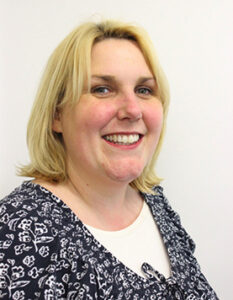
Karen (pictured above): Schools being able to have the resources that are needed makes all the difference to the children we support. Our schools workers are doing a fantastic job in difficult circumstances, but the education system needs to be resourced properly by government – not people’s goodwill.
As a special educational needs worker, my greatest achievement is just being a part of children’s journeys to adulthood and seeing them achieve, succeed and thrive. Between 2001 and 2009, I worked for a really inclusive head teacher in a school that provided the ideal education experience for all children, which offered a broad and balanced curriculum, where every child had the ability to achieve, and work to their strengths. I just want rainbows and unicorns really, that’s what I want for education.
Pat: If I had a budget for schools, I’d love to see a system in every school where children had access to musical instruments. Joining the orchestra was a formative part of my experience at school, and it was only possible because my family, with four kids and only one parent working, could afford it. If we’re talking about being able to do whatever we want, I would love to see every child have the opportunity to make a choice about that.
Helen: Ultimately what you’re saying is you want every child to have the education that these politicians give their own children. For me, when it comes to libraries, I want every city, town and village to have a decent purpose-built, lovely library building. The government have closed almost 800 libraries since 2010.
I’d want all of these libraries to have separate children’s libraries, to hold children’s activities. This is an area that’s largely disappeared due to funding cuts. If all libraries could have a proper programme of children’s activities, including after-school sessions, with authors coming in to speak to kids, illustrators doing workshops, book groups and homework clubs, it would be transformative for communities. We lack the funding for these things, so library staff often are left to buy materials ourselves.
Karen: I remember that’s what libraries were like in the 1980s, I’d go with my brother and we’d choose books and sit in the library every week. We knew the library staff, and would have a little chat with them. It was the hub of a community where everybody could go, and there wasn’t a cost, but there was always a smile.
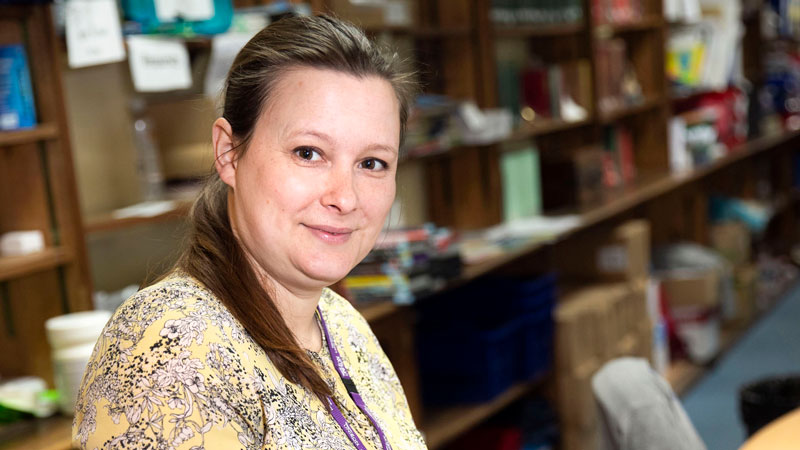
Image: Jess Hurd
Helen (pictured above): I do think that gets lost now, the bit about the smile. Library workers are sort of on the edge of social work, really. We see a lot of people who are within the social care system, chiefly homeless people, and we get to know them. It’s a safe, warm place for them to come and library workers might be the only people who pay them any attention or kind words. It’s the same with elderly people – we might be the only people they see in the day, and taking 10 or 15 minutes to have a chat can really make all the difference to them.
It’s about forging those relationships with people in the community, and it’s something to be proud of. There was one 91-year-old lady that was so attached to me that when I told her that I was leaving, she cried.
We get people coming in and asking us to help type their CV. I’d love for us to be able to do that, but when we have 700 questions through the door every day, and there’s only four of you, you just can’t spend two hours sitting with someone.
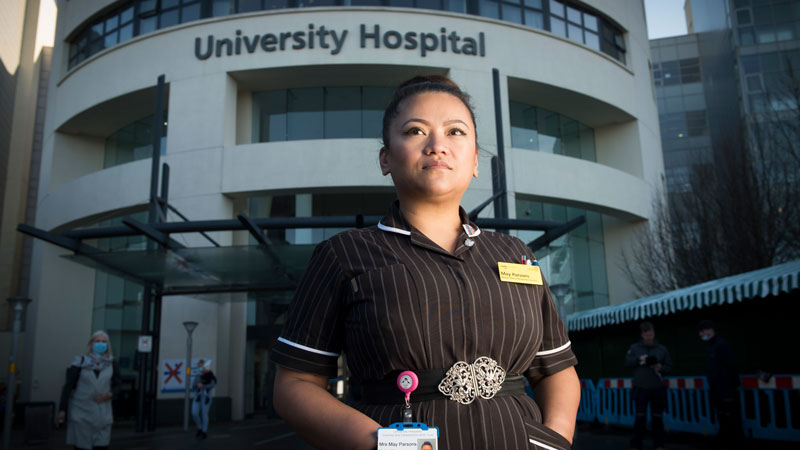
Image: Marcus Rose
May (pictured above): That quality time is missing in the NHS too. We’re all trying to manage with what little time we’ve got, and the workload we’ve got to deal with involves some quite complicated and complex patients.
And a patient doesn’t just mean a single person, we also have to consider their extended family. From a patient perspective, if I had more time, I’d love to be able to ask them how they like their tea or coffee, who their next of kin are, and be able to get to understand, for example, if they’re a person who gets bouts of confusion, whether anyone else knows about that, and if they might have a pending diagnosis of dementia. That’s integral to the care we can deliver.
How much time you can spare for an individual patient, and their journey from hospital to home, is what ensures they’re being given the best care possible.
The government have lost touch with what matters in public services, in a human kind of way. It really matters to also be able to take the time to ask your staff, “Are you alright?”
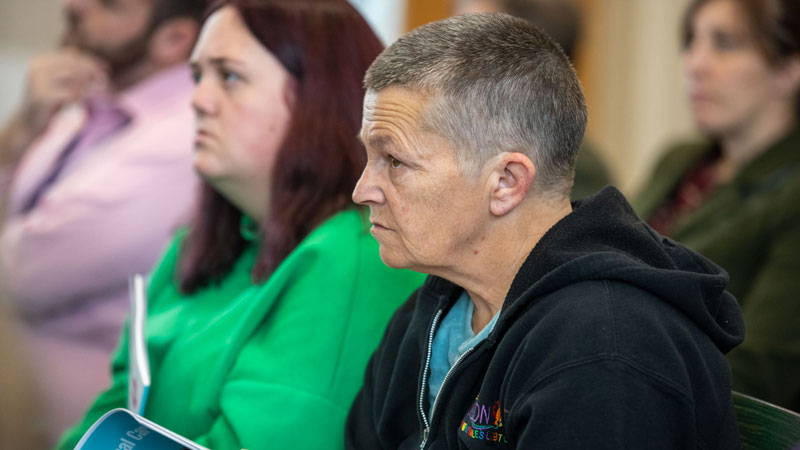
Image: Natasha Hirst
Pat (pictured above): The care sector is disintegrating for the same reason, you just can’t get any staff because we’re so badly paid with huge levels of responsibility. I know we’ve talked about children, but we should also talk about the services out there for adults with learning difficulties. The council decides they should go to a council-run day centre, not because it’s good for them, but because it’s cheap. Don’t get me wrong, some of these centres have excellent facilities, but they might be the totally wrong place for some people.
I recently took two people, who I care for, swimming for the first time at a lovely holiday home in Tenby, and it was brilliant. After 10 minutes, the lady who I support had become really relaxed and was cooing, which is her way of expressing happiness. It was wonderful. You just can’t do that in the council swimming pool.
If I had the power, I’d set up a holistic centre in every community that’s based on the needs of the individuals accessing it, not just what the council can afford. These services would be free to access, and people could lay on a heated water bed for a couple of hours to relax, or go for a swim, or have a free head massage. Some of the people I care for pay £30 for a head massage, I don’t think they should have to pay for that, especially not out of their benefits money. That would be my unicorns and rainbows.
The staff I work with really want to do stuff with people, even to just go and drive someone down to the seaside and have a cup of coffee on the seafront. We don’t have time to do that, because carers have to spend so much time on the computer now, rather than quality time with people we look after. We have to fill in every single detail of what a person’s done, drunk, eaten.
Karen: You know, it just makes me think. Public services were designed to have a person-centred approach, where we could all give time, and care, to meet the public’s needs. That’s what the NHS was devised for: to deliver care at the point of need, for anybody. But constant underfunding and austerity has removed our ability to give that time.
And so many of us are working and keeping the services running, but at what cost to us?
The fact is, investment in public services means giving time to people. And that’s what makes a public service what it is, for the worker and for the person receiving the service. The removal of funding removes the humane approach to public services.
Helen: I’d like to think I’ve provided a good service to people in the libraries, but it’s hard work, isn’t it? Trying to motivate yourself.
Karen: I get hope from my colleagues and the fantastic people I work with, who are all doing their absolute best. And knowing that people need you. And if you’re not there, then that person’s not going to get the help they need that day.
Pat: That’s why I love doing my care work. The man I look after can be grumpy, and doesn’t like people within 15 foot of him most of the time, but when I walk in to see him at eight o’clock at night, and I say “Hiya mate, how are you?”, he smiles at me, and it just wipes the week away. It’s those small moments, and the knowledge that you can really change someone’s day, in a small way.
May: Personally and professionally, my passion for nursing has never waned. The fire is burning even brighter knowing there’s so much I can offer. While we are here, trying our best and giving our best to fulfil our commitment to serve, there will always be hope.
Karen, Pat, Helen and May were speaking with Janey Starling

